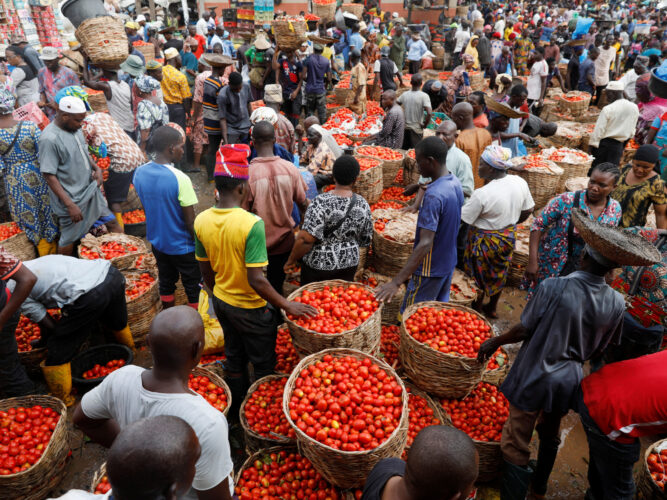Nigeria's inflation rate rose to 34.60% in November 2024, an increase of 0.72% from October's 33.88%. The latest Consumer Price Index report by the National Bureau of Statistics highlights a significant year-on-year rise, as the November 2024 figure is 6.40 percentage points higher than the 28.20% recorded in November 2023.
The inflation surge is primarily driven by rising food prices, which continue to strain Nigerian households. While the month-on-month inflation rate saw a slight deceleration, standing at 2.638% in November compared to 2.640% in October, the annual increase underscores ongoing pressures on consumers.
Food inflation climbed sharply to 39.93% in November, up from 32.84% the previous year, with staple items like yam, rice, maize, and palm oil experiencing significant price hikes. On a month-on-month basis, food inflation rose by 2.98%, slightly above October's 2.94%, driven by higher prices for fish, rice, dairy, and meat. The twelve-month average food inflation for November reached 38.67%, reflecting an 11.58 percentage point increase from the previous year's 27.09%.
Core inflation, which excludes food and energy prices, also surged to 28.75% in November 2024, compared to 22.38% in November 2023. This reflects rising costs in sectors such as transportation, housing, and personal services, with notable increases in taxi fares, bus prices, rents, and grooming services. Although month-on-month core inflation dipped slightly to 1.83% from October's 2.14%, the twelve-month average rose to 26.64%, up from 20.35% in November 2023, indicating widespread price pressures across the economy.
Regional disparities in inflation were evident. Bauchi, Kebbi, and Anambra recorded the highest year-on-year inflation rates at 46.21%, 42.41%, and 40.48%, respectively, while Delta, Benue, and Katsina had the lowest rates, ranging from 27.47% to 29.57%. Month-on-month, Yobe, Kebbi, and Kano experienced the steepest increases, while Adamawa, Osun, and Kogi recorded the slowest rises.
Food inflation varied across regions as well. Sokoto, Yobe, and Edo recorded the highest year-on-year food inflation rates at 51.30%, 49.69%, and 47.77%, while Kwara, Kogi, and Rivers saw slower increases at 31.39%, 32.95%, and 33.27%. Month-on-month food inflation was steepest in Yobe, Kano, and Kebbi with rates of 6.52%, 5.95%, and 5.68%, respectively.
Urban inflation outpaced rural inflation, standing at 37.10% in November 2024, compared to 32.27% in rural areas. Year-on-year, urban inflation rose by 6.88 percentage points while rural inflation increased by 5.84 percentage points. Month-on-month, urban inflation climbed by 2.77%, slightly higher than rural inflation's 2.51%.
The twelve-month average for urban inflation reached 35.07%, an increase of 9.62 percentage points from November 2023, while rural inflation's average rose to 30.71%, up by 8.00 percentage points.
The persistent rise in inflation underscores the significant challenges facing Nigerian consumers and businesses as the cost of living continues to escalate.









